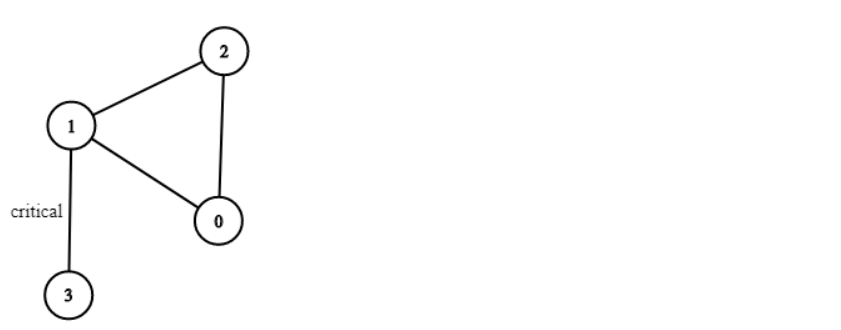|
|
马上注册,结交更多好友,享用更多功能^_^
您需要 登录 才可以下载或查看,没有账号?立即注册
x
There are n servers numbered from 0 to n-1 connected by undirected server-to-server connections forming a network where connections[i] = [a, b] represents a connection between servers a and b. Any server can reach any other server directly or indirectly through the network.
A critical connection is a connection that, if removed, will make some server unable to reach some other server.
Return all critical connections in the network in any order.
Example 1:

Input: n = 4, connections = [[0,1],[1,2],[2,0],[1,3]]
Output: [[1,3]]
Explanation: [[3,1]] is also accepted.
Constraints:
1 <= n <= 10^5
n-1 <= connections.length <= 10^5
connections[i][0] != connections[i][1]
There are no repeated connections.
- class Solution:
- def criticalConnections(self, n: int, connections: List[List[int]]) -> List[List[int]]:
- graph = [[] for _ in range(n)]
- visitedTime = [0 for _ in range(n)]
- lowTime = [0 for _ in range(n)]
- visited = [False for _ in range(n)]
- result = []
- time = 0
-
- for connection in connections:
- first = connection[0]
- second = connection[1]
-
- graph[first].append(second)
- graph[second].append(first)
-
-
- def dfs(curt: int, parent: int):
- nonlocal time
- visited[curt] = True
- visitedTime[curt] = lowTime[curt] = time
- time += 1
-
- for neighbor in graph[curt]:
- if neighbor == parent: continue
-
- if not visited[neighbor]:
- dfs(neighbor, curt)
- lowTime[curt] = min(lowTime[curt], lowTime[neighbor])
- if visitedTime[curt] < lowTime[neighbor]:
- result.append([curt, neighbor])
- else:
- lowTime[curt] = min(lowTime[curt], visitedTime[neighbor])
-
- dfs(0, -1)
- return result
|
|
 ( 粤ICP备18085999号-1 | 粤公网安备 44051102000585号)
( 粤ICP备18085999号-1 | 粤公网安备 44051102000585号)